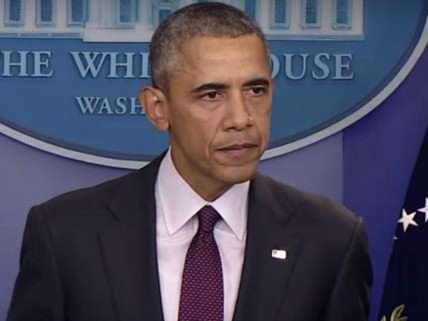Obama's Empty Gun Control Promise
Any attempt to stop would-be murderers from buying guns is bound to be overinclusive, underinclusive, or both.

President Obama is tired of calling for more gun control after every mass shooting, and I am tired of explaining why that knee-jerk reaction is illogical. But he feels duty-bound to continue ("each time this happens, I'm going to bring this up," he says), and I guess I do too.
Last night Obama gave an impassioned 13-minute speech, ostensibly in response to yesterday's murder of nine people at Umpqua Community College in Roseburg, Oregon, by a gunman who died after a shootout with police. The president insisted that "modest regulation," consistent with the Second Amendment rights of "law-abiding gun owners," could "prevent this carnage from being inflicted someplace else in America." But as Brian Doherty pointed out, Obama did not mention a single specific policy fitting that description.
That telling omission makes it pretty hard to buy Obama's argument that anyone who opposes "common-sense gun-safety laws" has blood on his hands. "This is a political choice that we make to allow this to happen every few months in America," he said. "We collectively are answerable to those families who lose their loved ones because of our inaction." If only we had done something, in other words, those people in Oregon would still be alive. But we are left to guess what that thing might be.
Obama did offer some clues. "It cannot be this easy for somebody who wants to inflict harm on other people to get his or her hands on a gun," he said. So presumably the "common-sense gun legislation" he supports has something to do with making it harder for would-be mass murderers to obtain firearms. The problem is that would-be mass murderers look a lot like "law-abiding gun owners" until they commit their crimes (because that is what they are), and any effort to distinguish between the two groups is bound to be underinclusive, missing seemingly harmless people with murder in their hearts, or overinclusive, depriving actually harmless people of their constitutional rights. Probably it will be both.
That is certainly true of existing restrictions on firearm ownership, which exclude millions of people—including pot smokers, illegal immigrants, nonviolent felons, and the targets of involuntary psychiatric treatment—who would never have used a gun to harm anyone. Meanwhile, these rules allow the vast majority of mass shooters to legally buy their weapons because at the time of the purchase none of the disqualifying criteria applies to them. Strengthening enforcement of these restrictions, whether by making databases more complete or by requiring background checks for private gun transfers as well as sales by federally licensed firearm dealers (as Oregon started doing in August), therefore will do little to prevent mass shootings, but it will deprive many people who pose no threat to others of a basic human right: the right to armed self-defense.
We do not know yet where the Oregon shooter obtained his weapons (a rifle and three handguns), whether he had a disqualifying criminal or psychiatric record, or whether he underwent a background check. Maybe he will turn out to be an exception: a mass shooter who was legally disqualified from buying guns for a reason that would have been flagged by a properly performed background check. But even if that's true, it does not change the basic picture: Restrictions on gun ownership affect far more innocent people than criminals, who generally find a way around them, and mass shooters typically do not even need to avoid the background checks that Obama seems to think would stymie them.
There are similar problems with proposals to loosen the criteria for coercive psychiatric treatment. "It's fair to say that anybody who does this has a sickness in their minds," Obama said, "regardless of what they think their motivations may be." But how does he propose to identify this sort of mind sickness before the fact? Only a small percentage of people who receive psychiatric diagnoses commit violent crimes, and psychiatrists are notoriously bad at predicting which ones will.
Anticipating the charge that he is using a tragedy for political purposes, Obama embraced that description. "This is something we should politicize," he said. "It is relevant to our common life together, to the body politic." Obama is right that important political issues are at stake—in particular, the extent to which Americans should sacrifice their freedom for an empty promise of safety.


Show Comments (147)